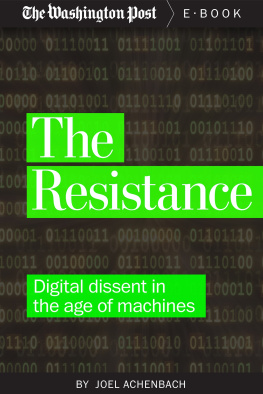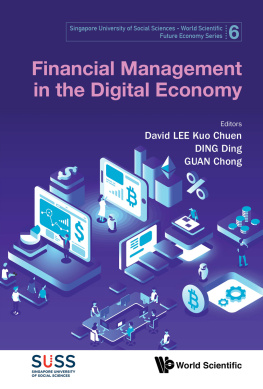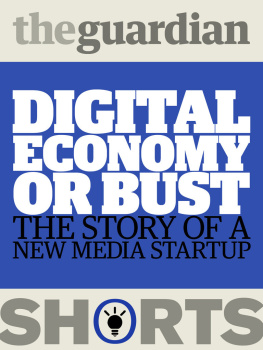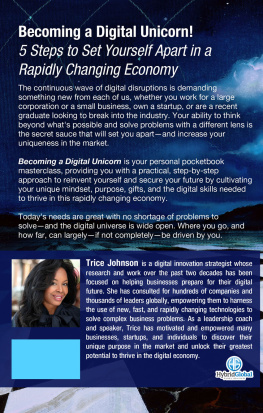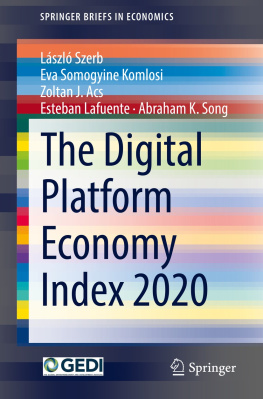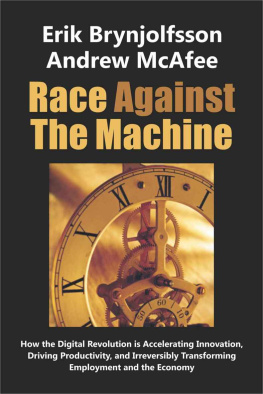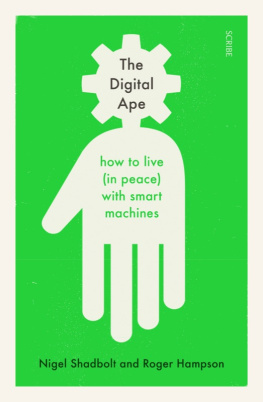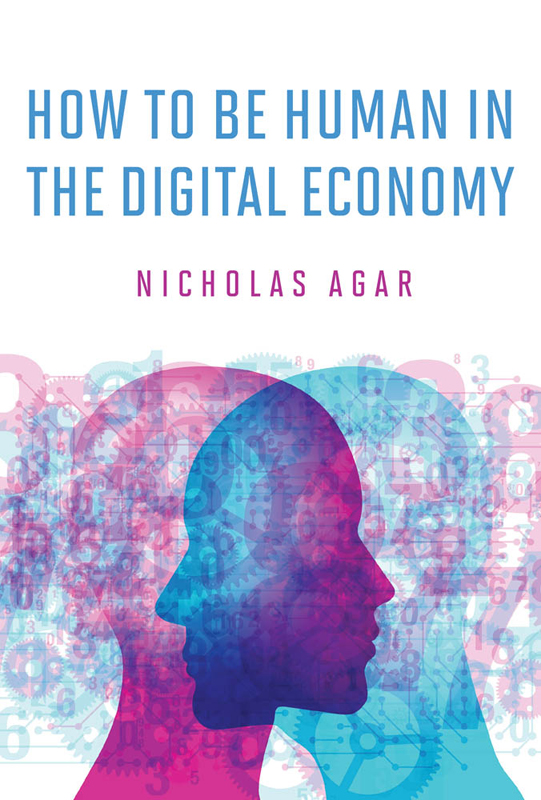All rights reserved. No part of this book may be reproduced in any form by any electronic or mechanical means (including photocopying, recording, or information storage and retrieval) without permission in writing from the publisher.
This book was set in Stone Serif by Westchester Publishing Services. Printed and bound in the United States of America.
Names: Agar, Nicholas, author.
Title: How to be human in the digital economy / Nicholas Agar.
Description: Cambridge, MA : MIT Press, 2018. | Includes bibliographical references and index.
Identifiers: LCCN 2018007542 | ISBN 9780262038744 (hardcover : alk. paper)
Subjects: LCSH: Internet--Social aspects. | Information technology--Social aspects. | Agent (Philosophy)
Classification: LCC HM851 .A333 2018 | DDC 302.23/1--dc23 LC record available at https://lccn.loc.gov/2018007542
Acknowledgments
I received invaluable suggestions and support from many people in the writing of this book. Colleagues, students, and friends read the manuscript or commented incisively on the books central ideas. I thank Daniel Agar, Jan Agar, Fin Ashworth, Pablo Barranquero, Billie Berry, Stuart Brock, Lucy Campbell, Phil Cook, Jonette Crysell, David Dwyer, Anthony Hall, David Lawrence, Simon Keller, Tom Malone, Edwin Mares, Cei Maslen, Johnny McDonald, Jonathan Pengelly, Sandra Park, Yiyan Wang, and Jennifer Windsor.
Anonymous readers for the Press offered comments leading to many improvements. I hope they can see how their suggestions made the books central claims more persuasive.
Im grateful to Phil Laughlin who expertly shepherded the book through from emailed proposal to printed book. Im also thankful to Marcy Ross and Bridget Leahy for correcting many awkward sentences.
I owe a different kind of gratitude to the staff at the Aro Street Caf, the Brooklyn Deli, and The Bresolin, who kept me supplied with coffee during the writing of these chapters and knew to cut me off at the earliest sign of caffeine psychosis.
Finally, I thank my fantastic wife Laurianne and my magnificent kids Alexei and Rafael. I hope Alexei and Rafael get to enjoy the fruits of a genuinely social age.
Introduction: Taking the Long View of Digital Revolution
The Digital Revolution is transforming human lives. Here I define the Digital Revolution as the widespread and rapid replacement of mechanical and analog electronic technologies by digital technologies. Ground zero for these upheavals and transformations is the digital computer. But the revolutions effects reach far beyond the stereotypical desktop word processor. Digital technologies are radically changing the ways that we share information, travel, treat disease, and party. An observable acceleration in the power of computers suggests that the transformations and dislocations we are currently experiencing are just the beginning.
Technological revolutions are, in the account presented in this book, more than just interesting events in human history. They are historys motors. The Renaissance jurist, statesman, and advocate of science, Francis Bacon, made an emphatic statement about the significance of technological advances to human affairs. Writing about the significance of his own ages big technological innovationsprinting, gunpowder, and the magnethe said no empire, no sect, no star seems to have exerted greater power and influence in human affairs than these mechanical discoveries. The Digital Revolution is influencing human affairs and seems set to have even greater influence. Thrilling gadgets and apps are merely its most visible manifestations.
We have a choice about how to view the Digital Revolution. This choice arises from the fact that it is a complex, multi-strand event that comprises many individuals and groups of individuals, and many technologies and categories of technology. The Digital Revolutions origin is difficult to determine with any precision. We know that its early stages featured the theoretical insights of Alan Turing and the tinkering of various geniuses at Bell Labs and Xerox Park in the middle years of the twentieth century. Perhaps its beginning can be traced back as far as Charles Babbage and Ada Lovelace in nineteenth-century England. Babbage was the first person to attempt (unsuccessfully) to build something that we today would acknowledge as a computer and Lovelace may have been the inventor of computer programming. A great deal has happened since these modest beginnings.
This book takes the long view of the Digital Revolution. The long view permits us to address questions about where digital technologies are taking us. It is not overly concerned about the specifics of todays buzz-worthy digital technologies. In the long view, the Macintosh computer, the Twitter social networking platform, and the Oculus Rift virtual reality headset feature only as undifferentiated parts of the onrushing blur of progress in digital technologies. An enhanced sense of the broad meaning of technological change compensates for the long views lack of detail. It offers an awareness of the grand sweep of technological change and its implications for human affairs. No fact about how integrated circuits process information describes their lasting effects on human experience and on the arrangements of the societies that host them. In the long view the Digital Revolution is the latest event in a historical sequence that begins with the Neolithic Revolutionwhich brought about farming, permanent settlements, and social hierarchiesand progresses to the Industrial Revolution, which brought on mechanization, mass production, and globalization. When we take the long view, we hope to see what is truly lasting about the Digital Revolution. Once we have gotten used to, or recovered from, the serial shocks of all these digital novelties, what effects will the Digital Revolution have on humanity?
The focus of the long view on trends means that it has little to say about some of our more immediate concerns. Suppose that you hear someone shouting Help, Im being assaulted! Its not particularly useful to respond Dont worry! Crime in this area is down 80 percent. Information about crime trends does nothing to address the immediate concerns of someone who is currently being mugged. Similarly, pointing to long-term trends does not offer much to someone who has just been put out of work by automation. The long view nevertheless offers something missing from accounts that focus on immediate effects. It directs attention away from the digital trees to gain a better understanding of the digital forest. A metaphorical squinting of the eyes brings more general truths into focus.
In pictures of Earth taken from space we can see the largest human-made objectsthe Great Wall of China, the Pyramids of Giza, and Dubais Palm Island. Also apparent are some of the patterns of human activitythe intense night-time lights of the cities of North America and Europe and the eerie absence of lighting in North Koreas night sky. At this scale, however, individual humans are invisible. Something similar happens in the long view of technological change. We lose sight of individuals. A history of the Industrial Revolution may tell us about the 204 miners who died in the Hartley Colliery disaster in 1862 when they were trapped below after an accident with the pits pump. We may have some abstract appreciation of the suffering caused to them and their families. But for people of the early twenty-first century interested in the long view of technological change, that disaster is mainly interesting for the lasting reforms it prompted. It led to legislation requiring coal mines to have at least two independent paths of escape. Viewed from the second decade of the twenty-first century, the miners of Hartley Colliery are dead and gone whether the disaster occurred or not.


